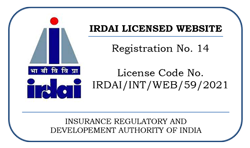What is Health Insurance?
Health insurance, also called a medical coverage plan or policy, is a must-have financial backup that helps cover medical expenses for injuries, illnesses, and more. From basic hospitalization coverage to all-inclusive plans with extra perks like preventive healthcare and death benefits, there’s a wide range of health insurance options out there. Want to dive deeper? Check out more about what health insurance is all about! Finding the perfect health plan keeps you and your family financially secure when unexpected health issues pop up.
Benefits of Getting a Health Insurance Plan for Your Family
One of the biggest plus points of buying a family floater health insurance plan is that it covers all your loved ones under a single policy, no matter their age. Here’s a quick breakdown of the other major benefits of having family health insurance:
1. One Policy for the Whole Family
Unlike individual health plans, a family floater policy covers all your family members under one plan. You can share a single sum insured with your spouse, kids, parents, and even in-laws. Plus, you don’t have to go through the hassle of buying and renewing separate policies for each person every year.
2. Stress-free Hospitalization
Just like individual health insurance, a family floater plan lets you and your family members get cashless treatment at any network hospital. The insurance company directly clears the medical bills after the treatment. That way, you can make sure your family gets the best medical care without stressing over hospital expenses.
3. Financial Security During Medical Emergencies
Health issues can come out of nowhere, and with medical costs shooting up in India, having a family health plan keeps you financially prepared for sudden medical emergencies. This ensures your loved ones get quality treatment without draining your savings.
4. More Affordable Premiums
Family floater plans are cheaper than buying separate individual policies for each family member. Even if you go for a higher sum insured, the premiums will still be more budget-friendly than paying for multiple individual policies. However, since parents may have age-related health issues, it’s smart to get a separate health policy for them to avoid high premiums.
5. Easy to Add New Family Members
Got a newborn baby or recently got married? No worries! You can easily add your spouse or child to the policy by paying an additional premium. Unlike individual plans, you don’t need to buy a whole new policy every time there’s an addition to your family. But if you’re adding your parents, make sure to increase the sum insured, as they may need frequent medical attention.
6. Employer Health Insurance Isn’t Enough
Many people think their company-provided health insurance is enough, but the reality is different. Most corporate policies only offer coverage up to ₹5 lakh, which may not be enough for an entire family’s medical needs. Plus, these policies only last while you're working at that company. A separate family health plan ensures your family's medical security even after you switch jobs or retire.
7. Tax Benefits on Family Health Insurance
Just like individual health insurance, family health insurance premiums are tax-deductible under Section 80D of the Income Tax Act. If you’re paying for both your family's and parents' health insurance, you can save even more on taxes!
What’s Included in a Family Health Insurance Plan?
Here’s a quick rundown of what most family health insurance plans cover:
- Hospitalization Costs – Any medical bills from hospital stays longer than 24 hours due to an illness or accident are covered.
- Day Care Procedures – Covers treatments that need hospitalization for less than 24 hours, like minor surgeries or advanced medical procedures.
- Ambulance Costs – Covers the expense of using an ambulance to reach the hospital during an emergency.
- Pre & Post-Hospitalization Expenses – Pays for medical tests, consultations, and treatments before you’re admitted and after discharge, up to a set number of days.
- Maternity Coverage – Most family health plans include pregnancy-related expenses and medical care for newborn babies.
- Organ Donor Costs – Covers the expenses for organ retrieval and transplant procedures.
- AYUSH Treatments – Pays for alternative medicine treatments like Ayurveda, Homeopathy, Yoga, Siddha, and Unani.
- Home Treatment (Domiciliary Care) – Covers expenses if a doctor advises home-based medical treatment instead of hospitalization.
- OPD Consultations – Takes care of doctor visits, medicines, and lab tests done on an outpatient basis.
- Daily Hospital Cash – Provides a daily allowance to cover extra expenses while you’re in the hospital.
- Mental Health Coverage – Covers treatment costs for mental health conditions like anxiety, depression, schizophrenia, etc.
- Consumables Cover – Some plans also pay for non-medical items like syringes, gloves, diapers, etc.
What’s Not Included in a Family Health Insurance Plan?
When picking a family health insurance plan, always go through the fine print to know what’s not covered. Here are some common exclusions in most family health policies in India:
- Non-accidental dental treatments
- Routine medical check-ups
- Cosmetic treatment or plastic surgeries
- Treatment that was taken overseas unless it is included in the plan
- Any illness or injury resulting due to war conditions, nuclear reaction, rebellion, acts of foreign enemies, etc.
- Injury or illness due to participation in unethical or criminal activities
- Self-inflicted injuries or suicide
- Treatment for drug or alcohol addiction
Things to Keep in Mind Before Getting a Family Health Insurance Plan
Here are a few must-know points before you lock in a family health insurance plan:
- Pre-existing diseases (PEDs) get covered after a waiting period of up to 3 years (as per the latest IRDAI rules). Some plans even cover PEDs from day 1, but this varies from plan to plan.
- You can add new family members to the policy anytime, but it’ll come with an extra premium cost.
- If you're adding new members (especially parents), it's smart to bump up the sum insured to make sure there’s enough coverage for everyone.
- Your dependent kid won’t be covered once they hit the max age limit mentioned in the policy—so check the fine print!
- Avoid adding senior citizen parents to your existing plan, as it’ll hike up the premium big time and might not give them the best coverage for their age-related health needs.
- Every family health insurance plan comes with lifetime renewability, so you can keep it going as long as you pay the premiums.



.png)
